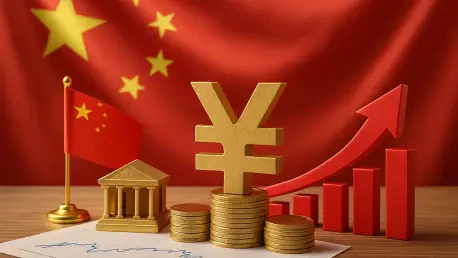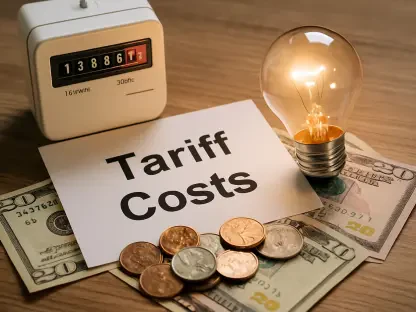In the heart of China’s festive season, as the nation celebrates the combined National Day and Mid-Autumn Festival during an extended eight-day holiday known as the Golden Week, a remarkable wave of consumer spending is injecting fresh energy into the economy. This period of celebration has transformed into a significant driver of economic activity, with millions of citizens flocking to both physical stores and digital platforms to purchase a wide array of goods, ranging from state-of-the-art electronics to energy-efficient household appliances. Far from being a mere seasonal uptick, this surge in consumption underscores the enduring strength and untapped potential of China’s market, which stands as the world’s second-largest economy. Amid global economic uncertainties, this spending boom serves as a testament to the resilience of domestic demand and highlights how cultural festivities can fuel substantial financial growth. As shoppers embrace the holiday spirit, the ripple effects of their purchases are felt across various sectors, setting a promising tone for economic stability and progress in the months ahead.
Unpacking the Golden Week Spending Surge
During the Golden Week, the economic landscape of China comes alive with impressive growth figures that paint a vivid picture of consumer enthusiasm. Data released by the Ministry of Commerce reveals a year-on-year sales increase of 3.3% for key retail and catering enterprises within the first four days of the holiday. Specific product categories are experiencing even more dramatic rises, with energy-saving home appliances seeing a 19% jump and smart refrigerators soaring by 20.7%. This robust performance in sales of high-tech items like smartphones, tablets, and digital cameras reflects a discerning consumer base eager to invest in innovative and sustainable solutions. The holiday period has become a critical window for retailers to capitalize on heightened demand, demonstrating how festive occasions can significantly amplify market activity and contribute to broader economic vitality.
Beyond the headline numbers, the spending surge during this holiday period signals deeper trends in consumer behavior that are shaping the retail sector. Shoppers are not merely indulging in impulsive purchases but are making deliberate choices, favoring products that blend cutting-edge technology with environmental consciousness. This shift is evident in the skyrocketing demand for intelligent home devices and other smart appliances, which are becoming staples in modern households. Retail spaces, both online and offline, are buzzing with activity as consumers take advantage of holiday promotions to upgrade their lifestyles. Such patterns suggest that the Golden Week is more than a temporary boost; it is a catalyst for long-term market evolution, reinforcing the importance of aligning product offerings with emerging preferences to sustain economic momentum in a competitive global landscape.
Government Strategies Driving Consumer Demand
A significant force behind the holiday spending boom lies in the strategic interventions by the Chinese government aimed at invigorating domestic demand. The consumer goods trade-in program has seen its funding doubled from 150 billion yuan to 300 billion yuan, providing substantial subsidies that make it easier for citizens to upgrade to modern electronics and appliances. As outlined in the latest Government Work Report, these policies are designed to position consumption as a central pillar of economic expansion. By offering financial incentives for purchasing premium and eco-friendly products, the government is not only spurring immediate sales but also fostering a culture of sustainable consumption that aligns with national environmental objectives, creating a dual impact on both economic and ecological fronts.
These policy measures are proving effective in reshaping the consumer landscape by lowering the financial barriers to acquiring high-quality goods. The subsidies have encouraged a wide range of households to invest in energy-efficient appliances and smart technologies, which might otherwise have been out of reach. This initiative is complemented by broader economic strategies that prioritize domestic consumption as a buffer against external economic pressures. The result is a noticeable uptick in retail activity during key periods like the Golden Week, where the convergence of festive spirit and policy support creates a perfect storm of economic activity. Such efforts highlight the government’s proactive role in steering the economy toward resilience, ensuring that consumer spending remains a reliable engine of growth even amid global uncertainties.
Restoring Confidence and Economic Stability
The holiday spending wave is a clear indicator of recovering consumer confidence that is vital for sustained economic health, as emphasized by insights from industry experts. Hong Yong from the Chinese Academy of International Trade and Economic Cooperation points out that shoppers are increasingly drawn to high-quality, cost-effective products, reflecting a growing trust in the market’s stability. This renewed confidence is crucial, especially when viewed against the backdrop of global economic challenges, as it suggests that domestic consumers are willing to spend despite external headwinds. The focus on value-driven purchases during the holiday season underscores a maturing market where economic optimism is gradually taking root, paving the way for consistent growth.
Further reinforcing this positive outlook, Pan Helin from the Ministry of Industry and Information Technology highlights the stabilizing impact of pro-consumption policies on the broader economy. Retail sales data supports this narrative, showing a 3.4% year-on-year increase in August, with expectations of even stronger performance in the fourth quarter fueled by holiday expenditures. This momentum indicates that the policies are not just short-term fixes but are laying the groundwork for enduring market resilience. The Golden Week spending surge serves as a microcosm of these broader trends, illustrating how targeted government actions can bolster consumer sentiment and drive economic activity, positioning China to navigate global uncertainties with greater assurance and strength.
Digital Platforms as Catalysts for Growth
E-commerce giants such as JD, Taobao, and Tmall are at the forefront of the holiday spending boom, acting as powerful engines of economic growth through their expansive digital marketplaces. Online sales have seen a remarkable 9.6% increase in the first eight months of the year, underscoring the pivotal role of digital retail in capturing holiday demand. These platforms enhance the shopping experience with deep discounts, user-friendly interfaces, and innovative technologies that attract a younger demographic of tech-savvy consumers. By bridging the gap between accessibility and affordability, e-commerce is redefining how holiday spending translates into economic gains, ensuring that even remote consumers can participate in the nationwide consumption surge.
The success of these digital platforms during the Golden Week also points to the importance of continued investment in technological advancements to sustain market growth. As online shopping becomes an integral part of the consumer journey, the ability of these platforms to offer personalized deals and seamless transactions is critical in maintaining consumer engagement. Analysts argue that the synergy between e-commerce innovation and national subsidy programs amplifies the impact of holiday spending, making high-end electronics and smart appliances more attainable for the average buyer. This digital transformation of retail not only boosts immediate sales figures but also sets a precedent for future economic strategies, emphasizing the need to prioritize digital infrastructure as a cornerstone of modern consumption patterns.
Evolving Consumer Trends Toward Sustainability
A notable shift in consumer preferences is shaping the holiday spending landscape, with a marked inclination toward intelligent and environmentally friendly products. Items like smart home devices and energy-efficient appliances are dominating shopping carts, reflecting a societal push toward sustainability and technological integration. This trend, supported by government subsidies, indicates that Chinese consumers are increasingly conscious of their environmental footprint while seeking to enhance their quality of life through advanced technology. The Golden Week has become a showcase for these evolving priorities, highlighting how cultural celebrations can intersect with modern values to drive economic activity in meaningful directions.
Additionally, the holiday period reveals a growing appetite for personalized and diverse commodities that cater to individual lifestyles and preferences. Shoppers are willing to invest in goods that resonate with their personal values, whether through unique design or enhanced functionality, signaling a market that is becoming more segmented and dynamic. This diversification of consumer choices, fueled by festive spending, is a boon for retailers who adapt to these nuanced demands. It also suggests that the economic impact of holiday consumption extends beyond immediate sales, influencing long-term market trends and encouraging businesses to innovate in ways that align with both consumer desires and national goals for sustainable development.
Reflecting on Economic Momentum and Future Prospects
Looking back, the surge in holiday spending during the Golden Week marked a pivotal moment for China’s economy, showcasing the profound impact of consumer activity on national growth. The impressive sales figures, bolstered by government initiatives and the rise of e-commerce, painted a picture of a market on the mend, with domestic demand proving to be a formidable force against global economic challenges. Expert analyses provided a lens through which the depth of this recovery was understood, affirming that strategic policies and consumer confidence played complementary roles in driving this success. As the festive period concluded, it left behind a legacy of economic optimism, evident in the robust performance of both traditional retail and digital platforms.
Moving forward, the insights gained from this holiday season should guide future economic strategies to sustain and build upon the momentum. Policymakers might consider further expanding subsidy programs to include emerging product categories, ensuring that innovation remains accessible to a broad consumer base. Retailers and e-commerce leaders could focus on enhancing digital experiences to retain the interest of younger demographics while continuing to align offerings with sustainability goals. As China positions consumption as a cornerstone of its economic agenda, leveraging the lessons from this Golden Week could solidify domestic demand as a reliable driver of progress, offering a blueprint for resilience in an ever-changing global landscape.









